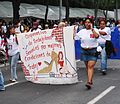Introduction

Sex work is "the exchange of sexual services, performances, or products for material compensation. It includes activities of direct physical contact between buyers and sellers as well as indirect sexual stimulation". Sex work only refers to voluntary sexual transactions; thus, the term does not refer to human trafficking and other coerced or nonconsensual sexual transactions such as child prostitution. The transaction must take place between consenting adults of the legal age and mental capacity to consent and must take place without any methods of coercion, other than payment. The term emphasizes the labor and economic implications of this type of work. Furthermore, some prefer the use of the term because it grants more agency to the sellers of these services. (Full article...)
Selected article -
Prostitution, as defined under modern Japanese law, is the illegal practice of sexual intercourse with an 'unspecified' (unacquainted) person in exchange for monetary compensation, which was criminalised in 1956 by the introduction of article 3 of the Anti-Prostitution Law (売春防止法, Baishun bōshi hō). However, the definition of prostitution made illegal under this law is strictly limited to sexual intercourse with an 'unspecified person', and does not criminalise the sale of numerous other acts performed by sex workers in exchange for compensation, such as oral sex, anal sex, mammary intercourse, and other non-coital sex acts; the Businesses Affecting Public Morals Regulation Law of 1948 (風俗営業取締法, Fūzoku eigyō torishimari hō), also known as the "Law to Regulate Adult Entertainment Businesses", amended in 1985, 1999 and 2005, regulates these businesses, making only one definition of prostitution in Japan illegal.
Following the criminalisation of payment for sexual intercourse, the sex industry in Japan has developed into a number of varied businesses and offering services not prohibited under Japanese law. These fall into a number of categories known by various euphemistic names, such as soaplands, fashion health shops, and pink salons, with the term "health" commonly being a euphemism for sexual services. These businesses typically operate out of physical premises, either with their own employees or freelancers such as call girls, who may operate via Internet dating sites known as deai sites (Internet dating sites) or via delivery health services. (Full article...)Selected images
Related portals
Selected general sex worker
Did you know...
- ... that a Harvey's franchise known for being a hub for sex work was described by one artist as a "legendary Toronto icon"?
- ... that Lea Ackermann, a German nun of the Missionary Sisters of Our Lady of Africa, fought against forced prostitution and sex tourism in East Africa?
Subcategories
Get involved

For editor resources and to collaborate with other editors on improving Wikipedia's Sex work-related articles, see WikiProject Sex work.
Associated Wikimedia
The following Wikimedia Foundation sister projects provide more on this subject:
-
 Commons
Commons
Free media repository -
 Wikibooks
Wikibooks
Free textbooks and manuals -
 Wikidata
Wikidata
Free knowledge base -
 Wikinews
Wikinews
Free-content news -
 Wikiquote
Wikiquote
Collection of quotations -
 Wikisource
Wikisource
Free-content library -
 Wikiversity
Wikiversity
Free learning tools -
 Wiktionary
Wiktionary
Dictionary and thesaurus
-

-

-

-

-
Random portal
Purge server cache





















































